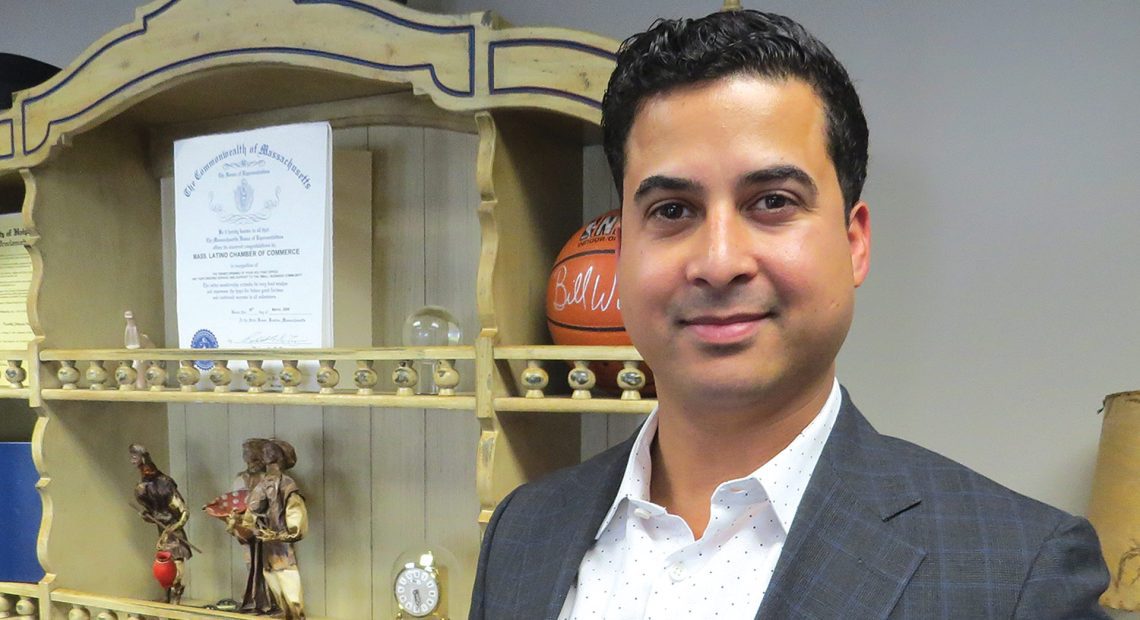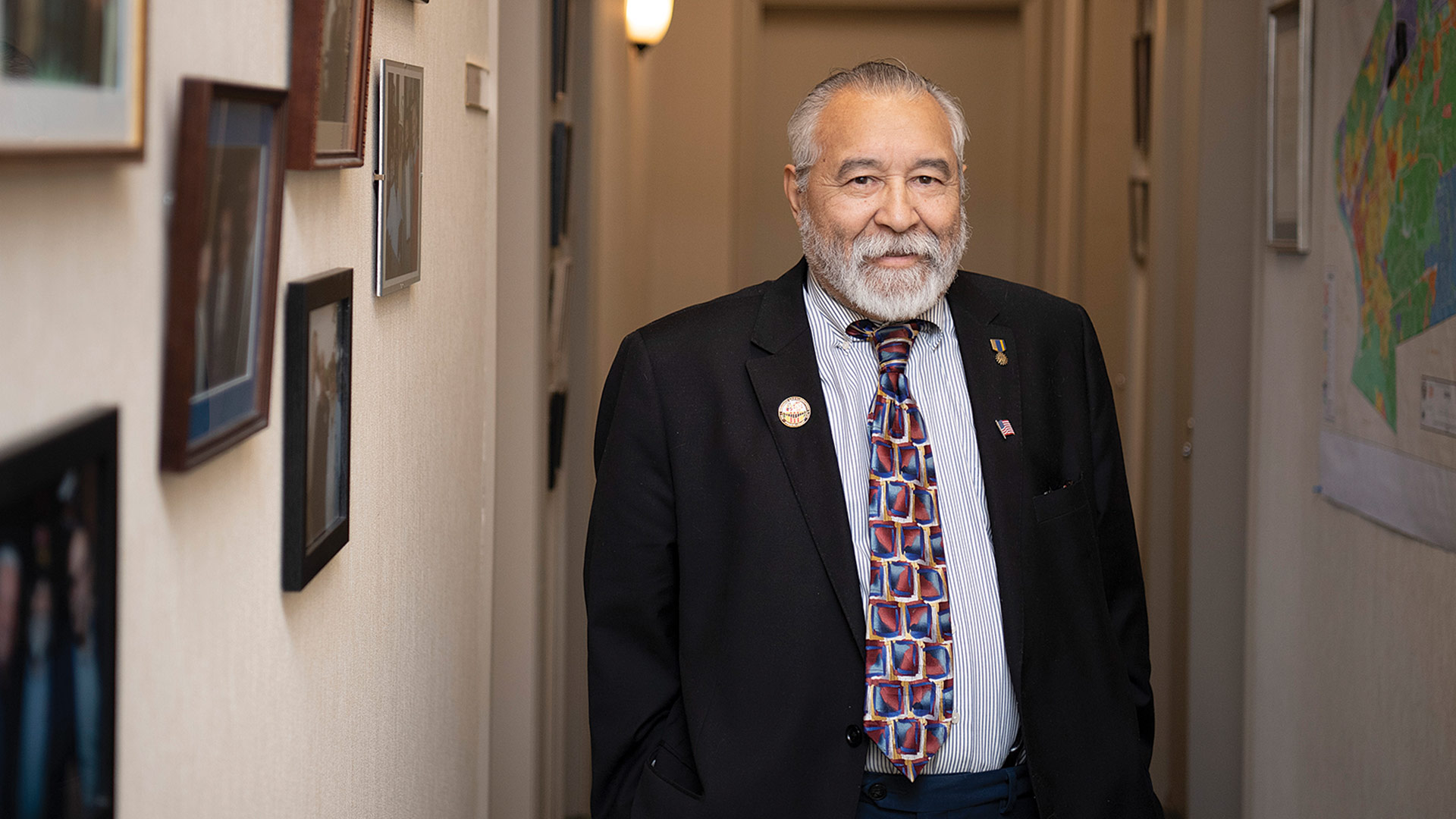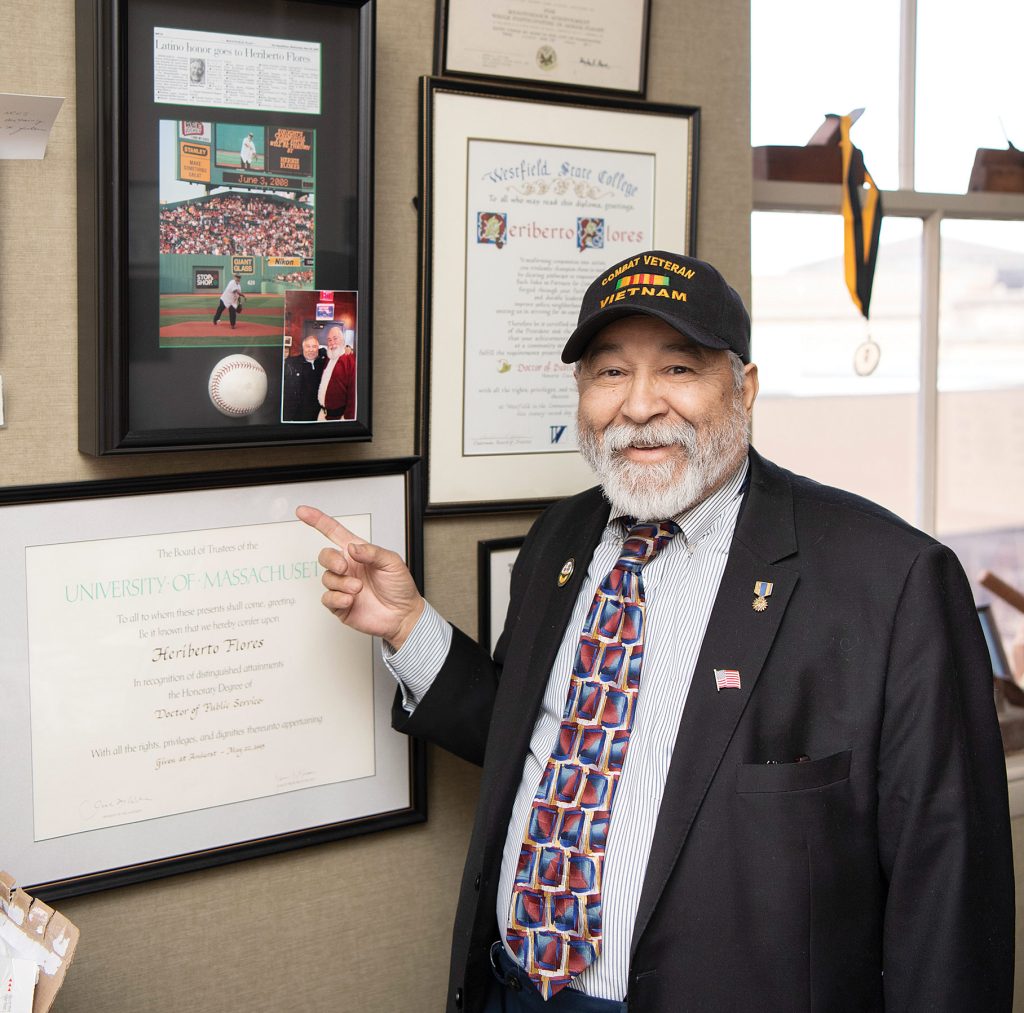Making Progress
The Latino Economic Development Council recently opened the doors to its new facility on Fort Street in Springfield. More importantly, it is off to a fast and impactful start as it works to open doors — and keep them open — for business owners and entrepreneurs, especially those in the large, and growing, Latino business community. It will offer microgrants and facilities for meetings and co-working opportunities, but most importantly, it will provide much-needed coaching in subjects ranging from finance to human resources to mental wellness.
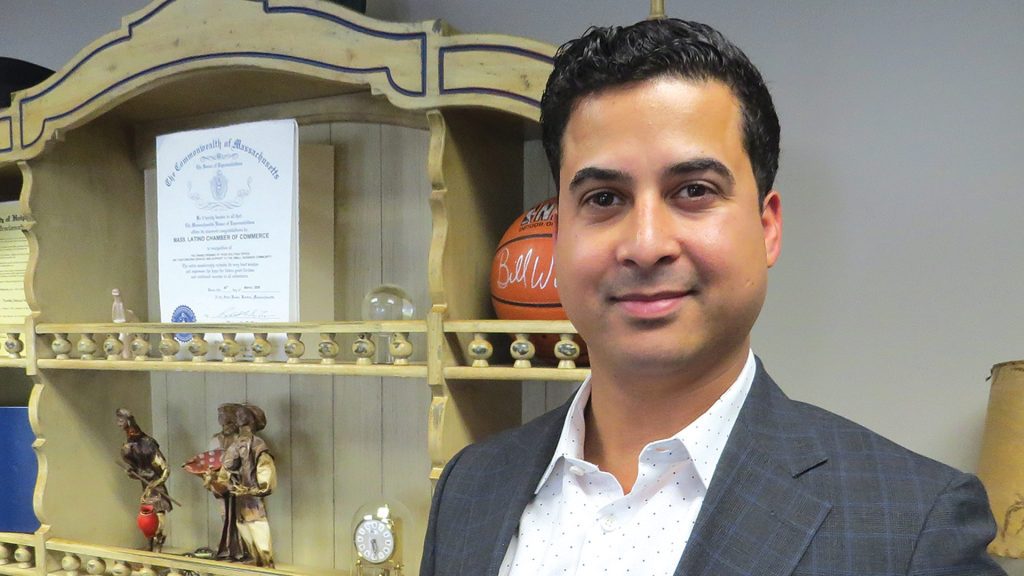
Executive Director Andrew Melendez
Andrew Melendez says he’s led a number of tours of the new Latino Economic Development Council headquarters facility on Fort Street in Springfield. More than he can count, actually.
He said the comments from those taking those tours vary, but there is a common, and very important, theme. Most say they’ve never seen anything quite like it — but wish they had.
Indeed, the Latino EDC, or LEDC, as it’s called, an affiliate of Partners for Community, is different. It is not a chamber of commerce, although it has some of those qualities and it partners with those institutions. It’s not an incubator, but it has some of those qualities, and it partners with those critical components of the entrepreneurship ecosystem as well.
It is a place where more than two dozen coaches, experts in many aspects of business, will make themselves available to business owners — especially those within the large and growing Latino business community, looking to take the next step with their venture, whatever that might be — and share what they know.
The council will also provide microgrants of a few thousand dollars or even less to assist with startup costs, while also providing co-working space and facilities — the PeoplesBank Business Lounge — that the business community can use for meetings and teleconferences.
“The main objective that we have is to help Latino business owners take their business to the next level.”
In short, what the LEDC wants to do is convert employees into employers, spark the growth and development of new businesses, and change the landscape on Main Street — and many other streets — in area communities, said Melendez, director of Operations for the LEDC.
It will do this not necessarily with microgrants — although they can certainly help a microbusiness or startup buy a sign, secure a new piece of equipment, or do some social-media marketing, perhaps — but with a combination of those grants and training programs from those coaches on how to qualify for a business loan, workforce training, mental wellness, and much more.
“We’ll be able to offer ‘Finance 101,’ ‘Accounting 101,’ ‘Building Wealth,’ ‘How to Lead by Example,’ and so on,” said Melendez, adding that the LEDC is partnering with a host of entities and agencies, from the state to the U.S. Small Business Administration in its efforts to build a larger, more sustainable Latino business community.

The facilities at the Latino Economic Development Council include space for meetings and community functions.
Overall, he said, the agency will focus on what he calls the three ‘Cs’ of helping business owners get to where they want to go: coaching, capital (those microgrants, but also counseling and technical assistance that might help them secure loans from area banks and credit unions), and connections to other business-development and economic-development-related agencies on the local, state, and national levels.
Adriano Vaccaro, CEO of Culture Redesigned, a culture strategist by trade and a workforce training coach for the LEDC, agreed.
“The main objective that we have is to help Latino business owners take their business to the next level,” she told BusinessWest, adding that the agency is putting together a comprehensive catalog of training programs. “And we’re attaching key performance indicators to the coaching sessions, so we can not only provide the skills and fill the gaps, but make sure we’re producing the results that are needed. It’s not just training — it’s training connected to a particular result.”
That’s an important distinction, she said, noting that the coaches are results-oriented and emphasize measuring — and sustaining — those results.
“It doesn’t mean that every business needs everything,” she went on. “We will do a needs assessment and make sure every business gets whatever they need, from where they’re starting their journey with us.”
Melendez concurred. “We want to make sure that, whether it’s a small business making $3 million or a microbusiness making $300,000 or an entrepreneur just starting up, they all have access to the same resources; that’s the fairness,” he said. “In January of 2020, Joe Biden said it’s not fair that some people get to pick up the phone and talk to a lawyer or an HR professional or someone to guide them in a workers’ comp claim, and other people don’t. This is us ensuring that our community — and I want to define our community as this whole community; anyone can come to the LEDC — has access to resources.”
As for the microgrants, made possible by federal ARPA funds awarded to Springfield and funneled to the LEDC, Melendez said there have already been more than 125 applications for such grants, and he expects that number to go much higher in the weeks to come.
BusinessWest recently sat down with Melendez and several of the coaches that are part of the LEDC to get some perspective on how this unique agency will work, how it will address stated goals, and, perhaps most importantly, how it will measure success.
The quick answer, as we’ll see, is that there will be many ways to do just that.
Getting Down to Business
It’s called the ‘imposter syndrome,’ and most business owners and professionals are by now quite familiar with that phrase.
It connotes persistent feelings that one isn’t … well, entirely comfortable in their own skin, professionally, and not fully credentialed, either literally or figuratively, to be worthy of the title on their business card.
Dr. Edna Rodriguez, director of Behavioral Health at Mercy Medical Center, one of the coaches at the LEDC (and one of BusinessWest’s 40 Under Forty honorees for 2022), said that many within the minority community fall victim to imposter syndrome.
“I want to be able to give back when it comes to development of business and entrepreneurship, teaching those basics, and helping people fine-tune their plans and the steps they need to take to become viable businesses in the community.”
“Many doubt if we have the level of skill, the ideas, and the tools … they struggle with confidence and knowing that that they can do and achieve the things they are good at,” she explained. “And that can really create a lot of anxiety and other issues that can definitely impact the mental health of an individual.”
And that’s just one of the matters she addresses with those she counsels as a mental-wellness coach for the LEDC.
“Our culture is beautiful and colorful and very integrated, but with that comes a lot of burden, especially when we’re talking about taking on everything that happens both at work and to home,” she noted. “Often, our Latino folks find a hard time managing stress and taking care of their physical and mental health, especially when they’re in the role of being a business owner.
“So my role is to individually help people understand how they can care for themselves, how they can find balance, and how to communicate their needs in an assertive way to both the people around them and the people who can help them,” she went on. “Sometimes it’s hard to just take that first step and open up and seek help.”
Helping business owners — and, again, especially those within the Latino community — cope with such issues is just one of the many focal points of the LEDC, which grew out of the Massachusetts Latino Chamber of Commerce and continues and expands upon its work, Melendez said.
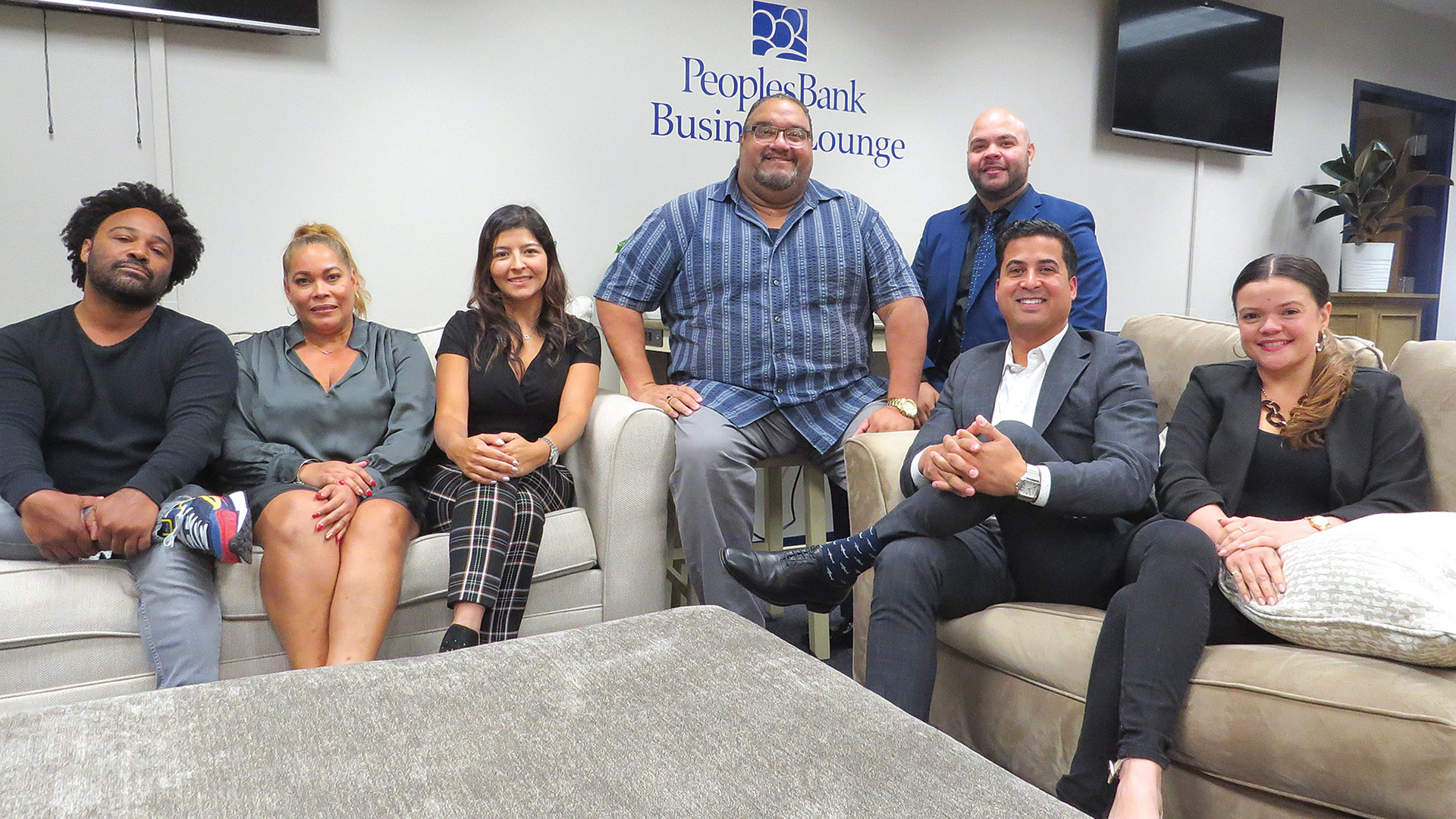
From left, Jose Hernandez, restaurant coach; Deborah Roque, accounting coach; Adriano Vaccaro; workforce training coach; Gilberto Amador, professional-development coach; Jesse Santos, finance and loan coach; Andrew Melendez; and Dr. Edna Rodriguez, mental-wellness coach.
And its model is unique, he went on, both in what it offers and that the services it provides are free.
“We want this to be free to the community, and I’m committed to that,” he said, adding that the LEDC was created to provide critical coaching and insight to business owners and aspiring entrepreneurs who may otherwise not be able to access such expertise.
Which brings him back to those tours he mentioned at the top and the comments from those who take them.
“I’ve taken dozens of people through the doors — people from Boston, Holyoke, Springfield, all over,” he said. “They’ve seen incubators with various businesses … but to walk in, and right where you walk in, there’s a marketing agency; an accountant; a psychologist; a professional-development trainer on safety; a professional-development trainer on diversity, equity, and inclusion; someone who can write a loan for you from beginning to end for free and send it to our partner banks … they haven’t seen that before.”
This is the essence of the LEDC, which Melendez likened to a credit union that doesn’t exclude anyone from membership. And the heart of the agency is its coaches, 28 of them at last count.
People like Rodriguez, the mental-wellness coach; Gilberto Amador, president of the Mass 2 Miami Consultant Group and professional development coach for the LEDC; Deborah Roque, owner of Affordable Accounting Services & Tax Preparation and an accounting coach for the agency; Jose Hernandez, owner of Palete Latin Cuisine in Springfield and the restaurant coach for the LEDC; Carlos DeLeon, a financial advisor with Ameriprise Financial, who provides guidance on personal finance; and Jesse Santos, a business finance and loan coach and officer with Latin Financial.
They and many others offer specific areas of expertise and, more importantly, a willingness to share it, that Amador summed up this way: “we bring something important to the table — experience, drive, and vision. And with the young people today, there’s going to be a generational gap if we don’t bring this information to them.”
Getting a Leg Up
Like Melendez and others we spoke with, Santos said capital is obviously critical to the advancement of any business venture, and is also an area many need help navigating, which is why he is now part of the coaching lineup at the LEDC.
“I’m here to guide those in the Latino community, and others as well, to get alternative funding, equipment financing, lines of credit — just help them get some funding,” he explained. “If the conventional banking system doesn’t help them or the rates are not to their favor or what they consider fair, they can come to me and we can broker it to other banks and other vendors to see what other opportunities we can get them.”
His work is an example of how the LEDC will work to provide guidance where and when it’s needed, and fill in gaps — in service, opportunities, and knowledge. And the coaches gathered around the conference room table at the LEDC said there are many such gaps, especially when it comes to the intricacies of running a business or simply taking an idea and transforming it into a business.
There are the basics — writing a business plan, deciding on a business classification, obtaining a doing-business-as certificate, and more, said Melendez, and coaches can help with all that. But then, there are the day-to-day, year-to-year matters, such as training staff, creating a culture, and handling HR matters. And the LEDC’s coaches can assist in these areas as well.
Amador, a serial entrepreneur himself but also an educator, said he’s been working with entrepreneurs for many years now and understands that many need help not only with their business, but with balancing business and life.
“I want to be able to give back when it comes to development of business and entrepreneurship, teaching those basics, and helping people fine-tune their plans and the steps they need to take to become viable businesses in the community,” he told BusinessWest, adding that one of these basics is simple financial literacy.
“A lot of them have ideas for starting a business, but they don’t realize that the financial piece is very important,” he said. “What does your profit-and-loss statement mean? What does you balance sheet mean? What is your cash flow? There are things that many in this [Latino] community don’t understand about business because we’ve been doing it a certain way, and we need to change that thought process. If we learn about investment and if we learn about how numbers work, then that makes it easier.”
While some coaching is broad in scope, it can also be specialized in its nature as well. Such is the case with Hernandez, who brings his experience in owning a restaurant, and in presenting Latin cuisine, to the forefront, and leads by example while also coaching others.
“I brought something different to the table and raised the bar with it,” he said of his eatery, located on Boston Road in Springfield. “A lot of people took notice, and you’re beginning to see where other restaurants are beginning to change the way they present the food, and I’m really happy about that.”
Overall, Amador echoed the thoughts of Melendez and others we spoke with when it came to seeing more individuals within the Latino community, which is entrepreneurial by nature, make the often-challenging leap from being an employee to being an employer.
“If there’s a McDonald’s in the North End of Springfield, I want to see a Latino owner of that McDonald’s,” he said. “I don’t want to hear people say, ‘let’s go to McDonald’s’ — I want to hear them say, ‘I want to own a McDonald’s.’”
Such sentiments, and such goals, are what prompted PeoplesBank to want to become involved with the LEDC, said Matt Bannister, the institution’s senior vice president of Marketing and Corporate Responsibility, adding that the bank became sold on the concept and its place in the region’s entrepreneurship ecosystem.
“Other groups have a mentor of two that can help you,” he said. “But they have specialists in whatever your issue is, and I think that’s a smart business model; it’s not one generalist who may or may not have experience with what you’re trying to do — they have a whole team of people, and it’s right in downtown Springfield.”
The bank’s participation started with the business lounge that now bears its name, he went on, adding that involvement may go to a higher level, perhaps by matching, or partially matching, the microgrants awarded to businesses by the LEDC.
Connecting the Dots
Summing up what the LEDC is and want he expects it will become in the months and years to come, Melendez said the agency strives to build individuals into “leaders, business owners, and change makers.”
That’s a tall task, he went on, but the ingredients are there for the agency to become transformative when it comes to the Latino business community and the overall economic landscape in Western Mass.
That’s why those who take the tour say they’ve never seen anything quite like it — and why they wish they had. u
George O’Brien can be reached at
[email protected]



